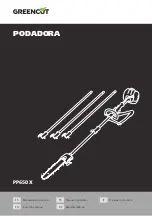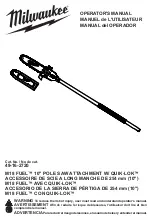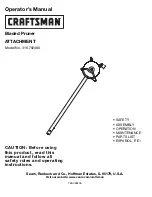
4
5
SPECIFIC SAFETY RULES
n
NEVER
hand hold a workpiece that is too small to be
clamped. Keep hands clear of the cutting area.
n
NEVER
reach behind, under, or within three inches
of the blade and its cutting path with your hands and
fingers for any reason.
n
NEVER
reach to pick up a workpiece, a piece of scrap,
or anything else that is in or near the cutting path of the
blade.
n
AVOID
AWKWARD OPERATIONS AND HAND
POSITIONS
where a sudden slip could cause your
hand to move into the blade.
ALWAYS
make sure you
have good balance.
NEVER
operate your miter saw
on the floor or in a crouched position.
n
NEVER
stand or have any part of your body in line with
the path of the saw blade.
n
ALWAYS
release the power switch and allow the
saw blade to stop rotating before raising it out of the
workpiece.
n
DO NOT TURN THE MOTOR SWITCH ON AND OFF
RAPIDLY.
This could cause the saw blade to loosen
and could create a hazard. Should this ever occur,
stand clear and allow the saw blade to come to a
complete stop. Disconnect your saw from the power
supply and securely retighten the blade bolt.
n
IF ANY PART OF THIS MITER SAW IS MISSING
or
should break, bend, or fail in any way, or should any
electrical component fail to perform properly, shut off
the power switch, remove the miter saw plug from the
power source and have damaged, missing, or failed
parts replaced before resuming operation.
n
ALWAYS STAY ALERT!
Do not allow familiarity (gained
from frequent use of your saw) to cause a careless
mistake.
ALWAYS REMEMBER
that a careless fraction
of a second is sufficient to inflict severe injury.
n
MAKE SURE THE WORK AREA HAS AMPLE LIGHT-
ING
to see the work and that no obstructions will inter-
fere with safe operation
BEFORE
performing any work
using your saw.
n
ALWAYS TURN OFF THE SAW
before disconnecting
it to avoid accidental starting when reconnecting to
power supply.
NEVER
leave the saw unattended while
connected to a power source.
n
THIS TOOL
should have the following markings:
a) Wear eye protection.
b) Keep hands out of path of saw blade
c) Do not operate saw without guards in place.
d) Do not perform any operation freehand.
e) Never reach around saw blade.
f) Turn off tool and wait for saw blade to stop before
moving workpiece or changing settings.
g) Disconnect power (or unplug tool as applicable)
before changing blade or servicing.
h) No load speed.
n
ALWAYS
carry the tool only by the carrying handle.
n
AVOID
direct eye exposure when using the laser guide.
n
SAVE THESE INSTRUCTIONS.
Refer to them
frequently and use to instruct other users. If you loan
someone this tool, loan them these instructions also.
WARNING:
Some dust created by power sanding, sawing, grinding, drilling, and other construction activities
contains chemicals known to cause cancer, birth defects or other reproductive harm. Some examples of these
chemicals are:
• lead from lead-based paints,
• crystalline silica from bricks and cement and other masonry products, and
• arsenic and chromium from chemically-treated lumber.
Your risk from these exposures varies, depending on how often you do this type of work. To reduce your exposure
to these chemicals: work in a well ventilated area, and work with approved safety equipment, such as those dust
masks that are specially designed to filter out microscopic particles.






































